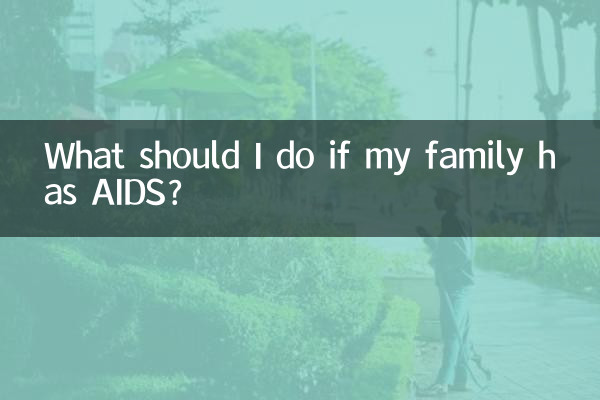What should I do if my family has AIDS?
AIDS is a chronic infectious disease caused by human immunodeficiency virus (HIV). Although modern medicine can effectively control the disease, social misunderstanding and discrimination against AIDS still exist. If there is an AIDS patient in the family, family members need to know about scientific nursing methods, psychological support and social resources to help the patient live a better life. The following is a compilation of hot topics and content about AIDS across the Internet in the past 10 days, as well as practical suggestions for home care.
1. AIDS-related hot topics in the past 10 days

| topic | heat index | Main content |
|---|---|---|
| Progress in new AIDS drugs | ★★★★☆ | Several pharmaceutical companies have announced that new anti-HIV drugs have entered the clinical trial stage and are expected to reduce side effects. |
| AIDS discrimination case | ★★★☆☆ | An incident of discrimination against people living with HIV in a certain workplace has sparked heated debate, with legal experts calling for stronger rights protection. |
| Home Care Guide | ★★★★★ | The Centers for Disease Control and Prevention released the "Family Care Manual for People Living with HIV" to provide detailed care recommendations. |
| Youth AIDS prevention education | ★★★☆☆ | Schools in many places have held AIDS prevention lectures, emphasizing the importance of early detection and safe sex. |
2. What should I do if my family has an AIDS patient?
1. Scientific understanding of AIDS
AIDS is mainly transmitted through blood, mother-to-child and sexual contact. It is not transmitted by sharing meals, hugging, shaking hands and other behaviors in daily life. Family members should learn authoritative medical knowledge to avoid panic due to misunderstandings.
2. Daily care points
| Nursing matters | Things to note |
|---|---|
| Medication Management | Supervise patients to take medications on time to avoid missing doses that may lead to drug resistance. |
| Wound treatment | Wear gloves when coming into contact with the patient's blood or body fluids, and disinfect the wound promptly. |
| diet nutrition | Provide high-protein, high-vitamin diet to enhance immunity. |
3. Psychological support and social resources
AIDS patients often suffer from depression and anxiety due to social prejudice. Families should:
4. Protection of legal rights and interests
my country's "Regulations on the Prevention and Treatment of AIDS" clearly stipulates that the rights of people infected with HIV such as employment and medical treatment are protected by law. If you encounter discrimination, you can seek help from the local health department or legal aid agency.
3. Conclusion
If your family has AIDS, scientific care and emotional support are equally important. Through correct knowledge and actions, family members can not only help patients improve their quality of life, but also help society eliminate stigma against AIDS. If you need further help, you can call the national AIDS consultation hotline: 12320.

check the details

check the details